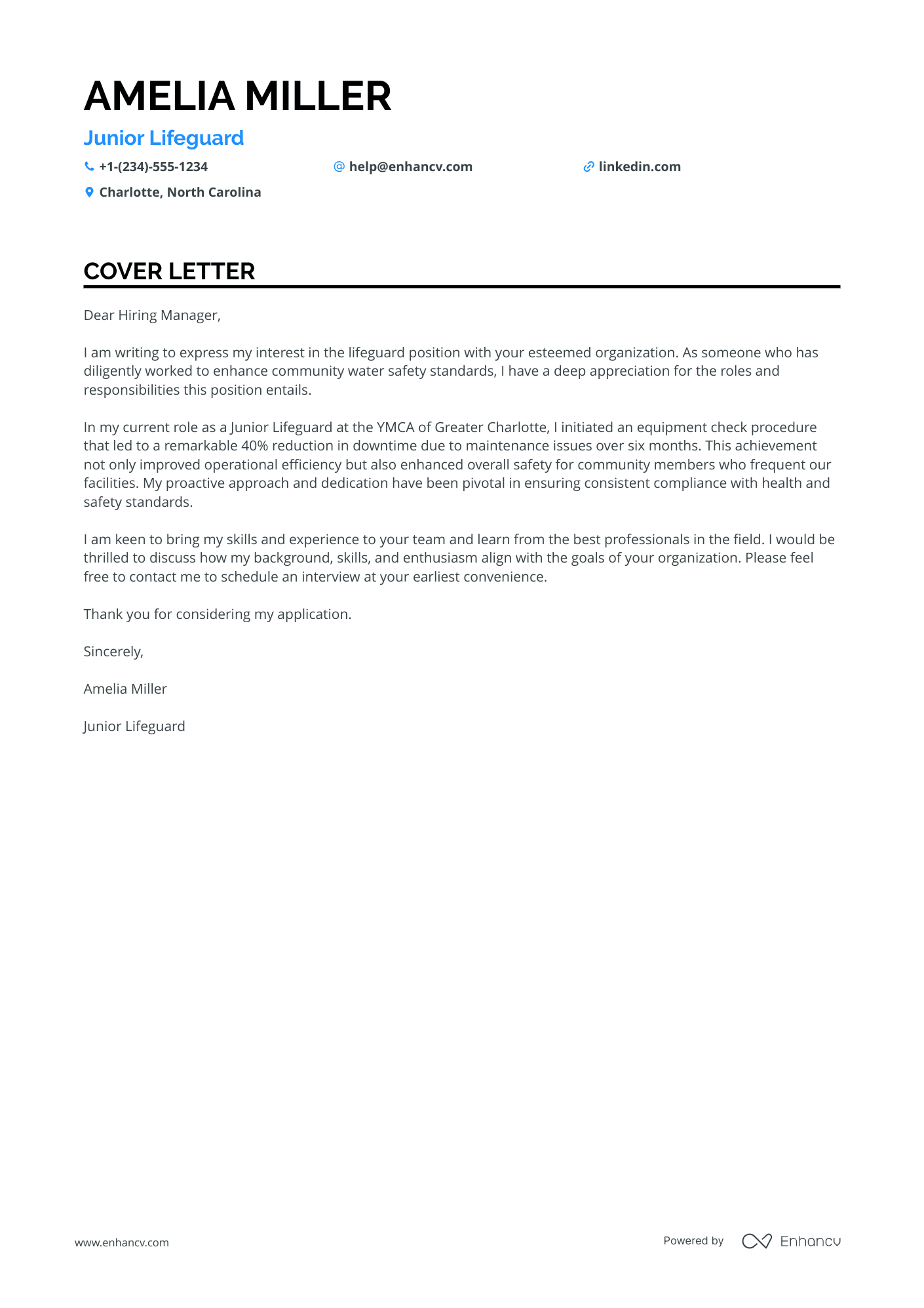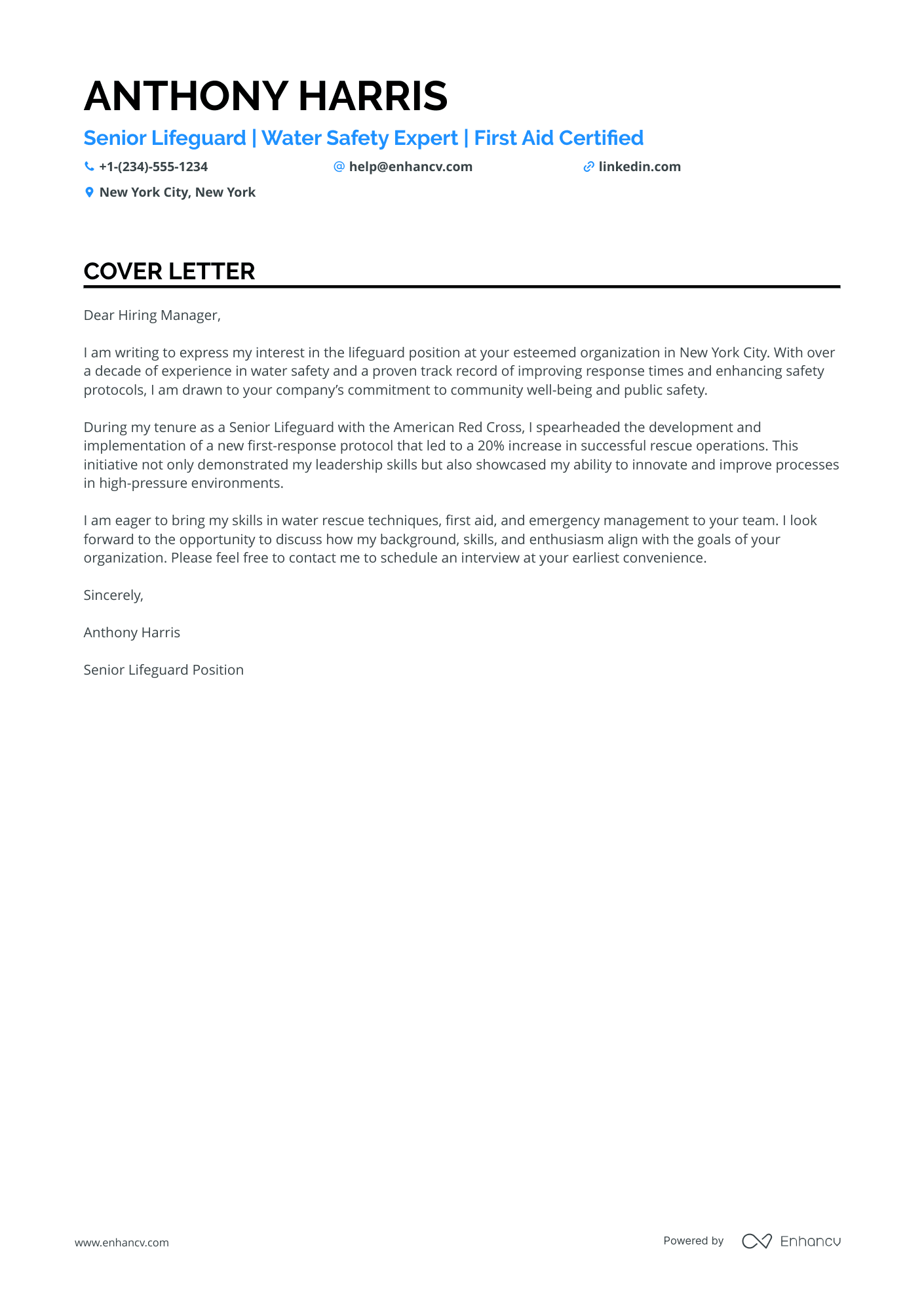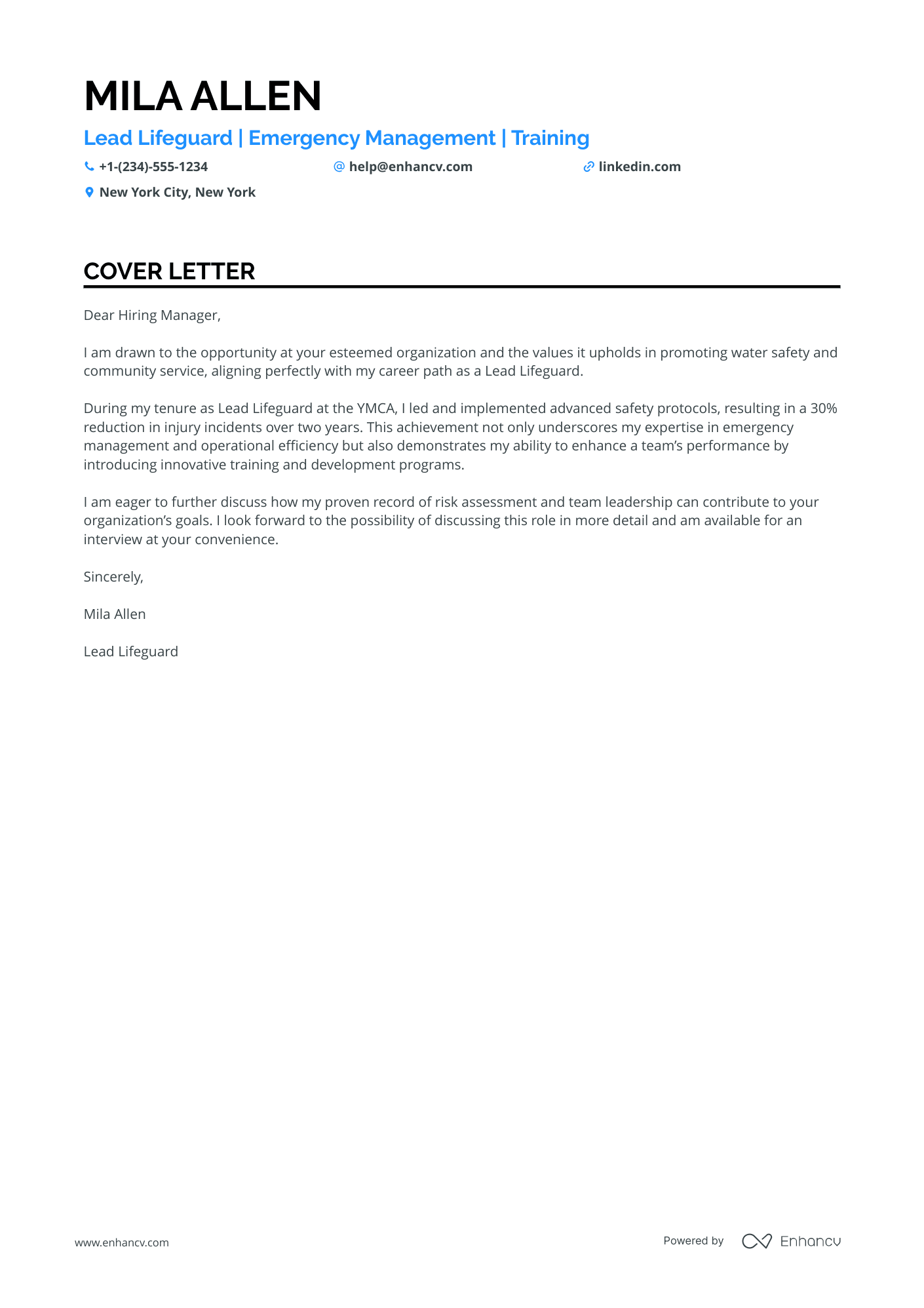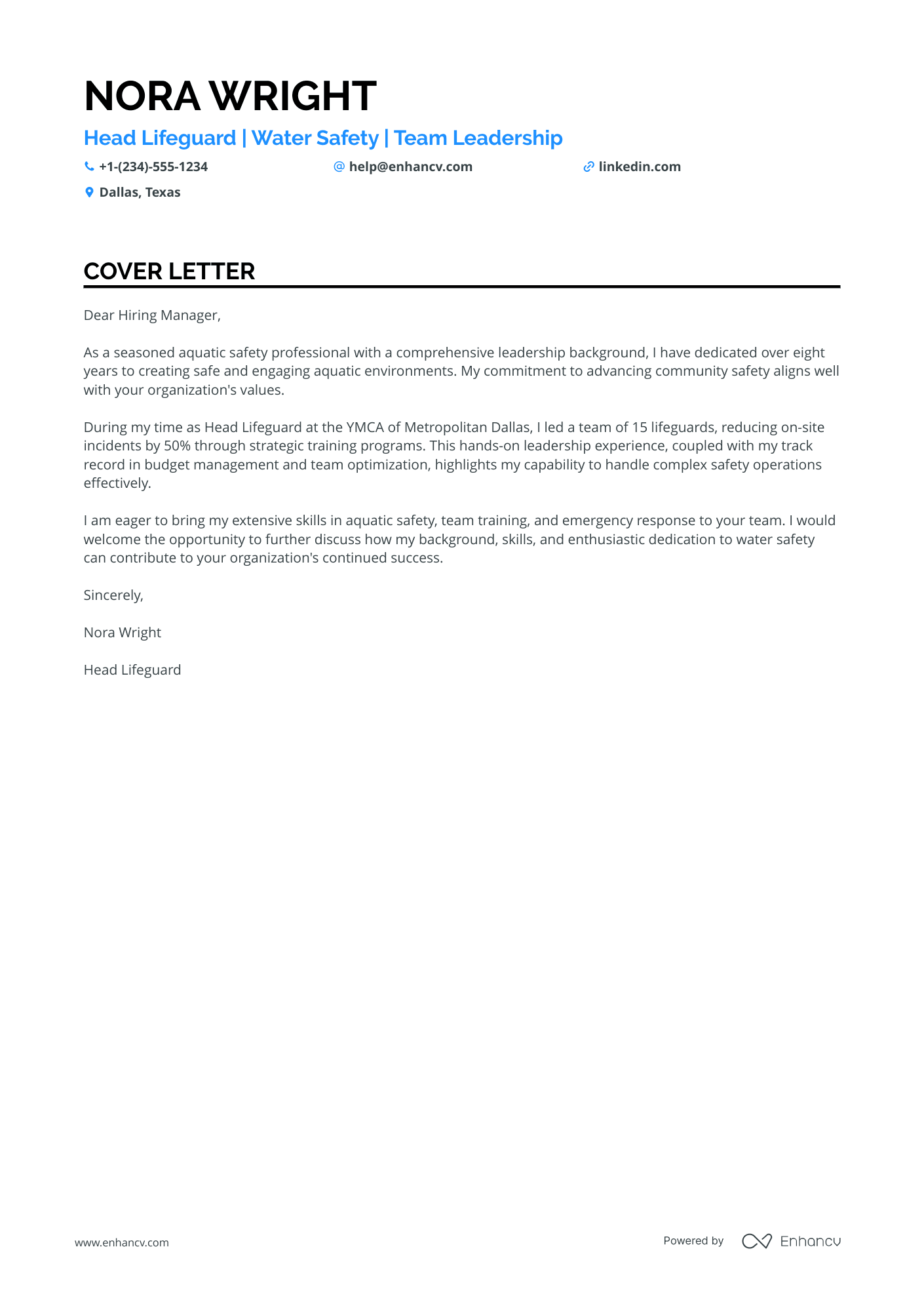Diving into the job market can be overwhelming, especially when it comes time to craft a lifeguard cover letter that makes a splash. You might find yourself staring at the blank page, unsure of how to highlight your accomplishments without echoing your resume. To stand out, focus on a singular, significant achievement—tell the gripping tale of your proudest professional moment. Remember, while being formal is key, dodge those overused phrases and keep it concise; aim for a one-page story of success.
- Step your best foot forward in the lifeguard cover letter introduction;
- Be inspired by other professionals' certified cover letters;
- Structure your lifeguard cover letter to feature what matters most;
- Close off your lifeguard cover letter to make a memorable impression on recruiters.
But where to start writing? Upload your resume into Enhancv's AI, which will prepare your lifeguard cover letter (all you need to do is personalize it, and you'll be good to go).
If the lifeguard isn't exactly the one you're looking for we have a plethora of cover letter examples for jobs like this one:
Drop your resume here or choose a file.
PDF & DOCX only. Max 2MB file size.
Lifeguard cover letter example
Lucas Rodriguez
Jacksonville, Florida
+1-(234)-555-1234
help@enhancv.com
- Emphasizing Relevant Experience: The cover letter highlights the candidate's direct experience in aquatic safety and emergency response which is critical for the role of Aquatics Facility Supervisor.
- Quantifiable Achievements: By citing specific achievements such as reducing response times by 30% and improving customer satisfaction by 20%, the candidate provides concrete evidence of their ability to make impactful changes.
- Leadership Skills: Referencing a role as a training coordinator underlines the applicant's competence in leading and improving a team—a crucial skill for supervising an aquatic facility.
- Proactive Nature: The closing statement in the cover letter demonstrates the candidate's initiative by suggesting a willingness to further discuss how they can meet the needs of the prospective employer, exemplifying a proactive attitude.
What are the basics of the design or format of your lifeguard cover letter?
To start, here's a reminder for you: the Applicant Tracker System (or software that is used to assess candidate profiles), won't be reading your lifeguard cover letter.
Recruiters enjoy reading lifeguard cover letters with a standardized format that uses:
- the same font as the resume (e.g. modern ones like Raleway or Volkhov are prefered over the clichéd Times New Roman or Arial);
- single spacing to keep the content concise and organized (this is all ready for you in our cover letter templates);
- a one-inch margin to wrap around the text, like in our cover letter builder;
- PDF as a file format, as it allows your design (and visual element) to stay the same.
Finally, we can't go on without mentioning the key sections of your lifeguard cover letter.
In the top one-third, make sure to include a header (with your contact information, name, role, and date), a salutation, and an introduction.
Next, follows the heart and soul of your lifeguard cover letter or its body.
End your lifeguard cover letter with a closing paragraph and, if you wish, a signature.
Not enough hours in the day? Try our free cover letter generator and get a polished letter in seconds.
The top sections on a lifeguard cover letter
- Header: This section includes your contact information and the date, ensuring the recruiter knows how to reach you and can file your application appropriately.
- Greeting: Tailor this section to the specific hiring manager, if possible, as showing that you've researched who's in charge of hiring can help you stand out as a dedicated candidate.
- Introduction: Briefly introduce yourself and state the lifeguard position you're applying for; highlight your enthusiasm for the role and any previous lifeguarding experience that demonstrates your suitability.
- Professional Experience and Skills: Use this section to detail your past lifeguarding roles, certifications (such as CPR or first aid), and any specific skills like strong swimming ability or experience with diverse populations, that align with the job requirements.
- Closing and Call to Action: Finish with a strong statement about your eagerness to contribute to the safety and enjoyment of the facility's patrons and an invitation for the recruiter to contact you for an interview.
Key qualities recruiters search for in a candidate’s cover letter
- Certifications in Lifesaving and First Aid: Recruiters look for evidence of formal training in lifesaving techniques, CPR, and first aid because these certifications are essential for a lifeguard's ability to respond effectively in emergencies.
- Strong Swimming Skills: Demonstrating a high level of swimming proficiency is crucial as a lifeguard is responsible for performing water rescues and ensuring the safety of swimmers.
- Vigilance and Observation: Recruiters prioritize candidates who exhibit the ability to remain alert and attentive, scanning their area of responsibility consistently, as this is critical to preventing accidents and identifying emergencies quickly.
- Experience in Water Safety and Rescue Techniques: Recruiters seek candidates with a background in water rescue, including the use of equipment and techniques appropriate for different scenarios, indicating readiness for action in diverse situations.
- Physical Fitness and Endurance: Lifeguards must be physically capable of performing rescues and remaining on duty for extended periods, so evidence of physical fitness and endurance is important.
- Excellent Communication Skills: Since lifeguards must communicate effectively with swimmers, enforce rules, and coordinate with other safety personnel during emergencies, strong verbal and nonverbal communication skills are highly valued.
How to address hiring managers in your lifeguard cover letter greeting
Goodbye, "Dear Sir/Madam" or "To whom it may concern!"
The salutation of your lifeguard cover letter is how you kick off your professional communication with the hiring managers.
And you want it to start off a bit more personalized and tailored, to catch the recruiters' attention.
Take the time to find out who's recruiting for the role (via LinkedIn or the company page).
If you have previously chatted or emailed the hiring managers, address them on a first or last name basis.
The alternative is a "Dear HR team" or "Dear Hiring Manger", but remember that a "Dear Ms. Simmons" or "Dear Simon," could get you farther ahead than an impersonal greeting.
List of salutations you can use
- Dear Hiring Manager,
- Dear [Company/Organization Name] Team,
- Dear [Recipient's Name],
- Dear [Recipient's Title and Last Name],
- Dear [Pool Manager or Aquatics Director],
Using your lifeguard cover letter intro to show your dedication
We know just how difficult it is to start writing your lifeguard cover letter introduction.
There are so many great qualities you have as a professional, which one should you choose?
How about writing up to two sentences about your passion and commitment to the work you do or are set to do?
Try to describe exactly what you enjoy about the potential role.
A positive attitude from the get-go will help you stand out as a motivated lifeguard professional.
What to write in the middle or body of your lifeguard cover letter
Here's where it gets tricky.
Your lifeguard cover letter body should present you in the best light possible and, at the same time, differ from your resume.
Don't be stuck in making up new things or copy-pasting from your resume. Instead, select just one achievement from your experience.
Use it to succinctly tell a story of the job-crucial skills and knowledge this taught you.
Your lifeguard cover letter is the magic card you need to further show how any organization or team would benefit from working with you.
Two ideas on how to end the final paragraph of your lifeguard cover letter
Closing your lifeguard cover letter, you want to leave a memorable impression on recruiters, that you're a responsible professional.
End your cover letter with how you envision your growth, as part of the company. Make realistic promises on what you plan to achieve, potentially, in the next six months to a year.
Before your signature, you could also signal hiring managers that you're available for the next steps. Or, a follow-up call, during which you could further clarify your experience or professional value.
Addressing limited to no experience in the lifeguard cover letter
There's nothing to worry about if you lack professional experience.
Your lifeguard cover letter could bridge the gaps in your professional history by focusing on what matters most to recruiters, that's either:
- skills - focusing on transferable ones you've gained, thanks to your life experience (e.g. volunteering, certificates, etc.);
- achievements - select the most relevant and noteworthy one from your history (e.g. education, projects, etc.);
- motivation - describe how you envision your professional growth in the next up to five years, thanks to this opportunity.
Key takeaways
Winning at your job application game starts with a clear and concise lifeguard cover letter that:
- Has single-spaced paragraphs, is wrapped in a one-inch margin, and uses the same font as the lifeguard resume;
- Is personalized to the recruiter (using their name in the greeting) and the role (focusing on your one key achievement that answers job requirements);
- Includes an introduction that helps you stand out and show what value you'd bring to the company;
- Substitutes your lack of experience with an outside-of-work success, that has taught you valuable skills;
- Ends with a call for follow-up or hints at how you'd improve the organization, team, or role.
Lifeguard cover letter examples
By Experience
Junior Lifeguard
- Highlighting Relevant Experience: The applicant references their current role as a Junior Lifeguard and their initiative in reducing equipment downtime by 40%, showcasing relevant experience and achievements in a similar position.
- Demonstrating Impact: By mentioning the effects of their initiatives (increased safety and operational efficiency), the applicant effectively demonstrates their impact and value to their previous organization.
- Alignment with Organization Goals: The applicant expresses a desire to contribute to the team and highlights an eagerness to align their skills with the organization's objectives, which is crucial for any role in safety and community service.
- Professional and Polite Tone: The cover letter maintains a courteous and professional tone throughout, which is important in making a positive impression on hiring managers.
Senior Lifeguard
- Highlight specific experience in water safety, such as previous roles or significant responsibilities that demonstrate expertise and reliability in the field.
- Include quantifiable achievements, like a percentage increase in successful rescue operations, to showcase the impact of your contributions and effectiveness in similar environments.
- Emphasize leadership capabilities by mentioning any initiatives led, such as developing and implementing new protocols, which demonstrate proactive problem-solving skills and ability to improve processes.
Lead Lifeguard
- Emphasizing relevant experience: Highlighting the candidate's previous role as a Lead Lifeguard at the YMCA and the specific impact they had, such as a 30% reduction in injury incidents, showcases relevant experience and achievements.
- Alignment with company values: Mentioning how the organization’s focus on water safety and community service aligns with the candidate’s values and career goals establishes a connection with the company’s mission.
- Demonstrating leadership and innovation: Discussing the implementation of safety protocols and innovative training programs positions the candidate as a leader capable of driving improvements and managing a team effectively.
Head Lifeguard
- Emphasizing Leadership Experience: Highlighting over eight years of experience and specific leadership roles, like Head Lifeguard, showcases the candidate’s capability to manage and lead teams effectively.
- Quantifying Achievements: The candidate mentions reducing incidents by 50% through strategic training programs, providing a quantifiable measure of success that makes their impact tangible and compelling.
- Aligning with Organizational Values: The candidate aligns their commitment to aquatic safety with the organization's values, which demonstrates that they understand and are motivated by the company’s mission.
- Highlighting Relevant Skills: Stressing skills in team training, emergency response, and budget management underscores the candidate's comprehensive ability to handle complex and varied aspects of a lifeguard supervisory role.













